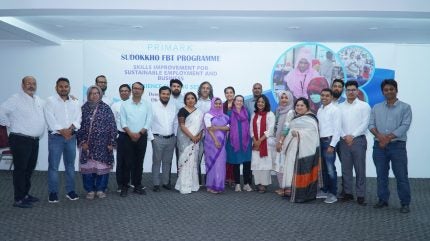
Two years after Primark and Rajesh Bheda Consulting (RBC) collaborated to upskill existing garment workers in Bangladesh through Sudokkho Training Programme, the duo recently brought together leaders at Brac Centre, Dhaka for an experience sharing session of Sudokkho.
Sudokkho is an upskilling and women career progression programme sponsored by Primark, which has seen Bangladesh’s leading suppliers and fourteen factories supply Primark.
RBC highlighted at an event that what stood out the most was the interactive session with the workers trained in varying fields such as supervisors, trainers and operators under the project who showcased confidence, conviction and content while sharing their stories.
The event concluded with felicitation of participating factory teams with certificates and crests.
RBC said articipants vowed to continue their efforts to upskill the workers and create a more supportive environment for the career progression of women and contribute to improving the competitiveness of the garment industry in Bangladesh.
Lindsey Block, head of social impact, ethical trade at Primark, said: “Sudokkho is successful because of the hard work of each and every stakeholder involved in the programme. Primark is proud to be in partnership with RBC to support positive change for those working in Bangladesh’s garment industry, especially women.”
Dr Rajesh Bheda, co-founder of RBC, quoted the former commerce minister of Bangladesh, Tipu Munshi, who said: “I consider all garment workers, managers and owners the ‘Swatantrata Senani’ (freedom fighters) of Bangladesh as they have made a big contribution towards the economic freedom and prosperity of the country.”
Acording to Dr Bheda, the production lines managed by women supervisors, former operators, trained under Sudokkho program have experienced 6% increase in efficiency level and their target achievement rate has gone up by 9%.
Key findings and impact of Sudokkho project
RBC shared that the project had a “profound impact” on workers lives as evident from the results of the independent impact assessment undertaken by 60 Decibels, based on the tele-interview of 611 workers for Primark and shared by Primark’s Bangladesh team. The key findings were:
- 91% respondents said that due to improved skills their earning has increased by up to 72% in last 2-3 years. This has impacted their personal lives greatly.
- 91% suggested that their children now have access to quality education and health care service.
- About 88% said that they now have the ability to Think, Plan and Act, not just at work but also in their life in general and are able to manage their time better.
- 85% said that their wellbeing has improved and they feel secure in their jobs. The workers have shared that their respect in their community has also increased due to career progression through Sudokkho.
As part of Sudokkho, 45 women operators from four factories have been trained in supervisory capabilities, including 180 garment workers who have been upskilled between September 2021 until December 2023, added RBC.
RBC further pointed out that 5,774 trainees have been trained to become operators and 14834 on-floor upskilling activities were conducted for existing workers resulting in an impressive improvement in their production capacity by 21.4%.
Primark’s country project manager Neelanjana Khan said: “It’s overwhelming to hear these trainers and supervisors who have been developed under Sudokkho. I am at a loss for words to express the satisfaction and gratitude we feel listening to them. It is due to the support and dedication of the suppliers, factory management, our trainers and trainees and the supervisor that the programme stands where it is today.”



